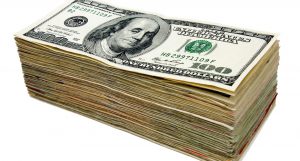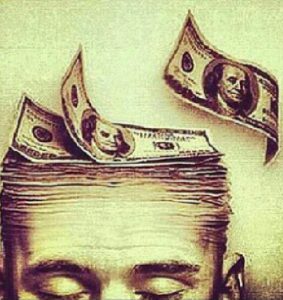Signs You Need To Be On A Budget
So it’s Friday and you’ve got the weekend on your mind. Spring is starting to peek out from behind the clouds and the weather is getting warmer and warmer. You  can feel spring fever itching and it’s making you want to be outside and go out and take a big bite out of life. What should I do this weekend? Should I go out for drinks with my friends? Is it time to try that fancy place that brings me an adult beverage and snacks while I work on my golf swing? Wait! Since it’s spring that means I need to start on my spring cleaning and my home improvement list too! I promised this was the year I replace the fence and paint the outside of the house and the HVAC guy said my air conditioner is on the 18th hole. And I’ve gotta start planning the summer vacation already…..
can feel spring fever itching and it’s making you want to be outside and go out and take a big bite out of life. What should I do this weekend? Should I go out for drinks with my friends? Is it time to try that fancy place that brings me an adult beverage and snacks while I work on my golf swing? Wait! Since it’s spring that means I need to start on my spring cleaning and my home improvement list too! I promised this was the year I replace the fence and paint the outside of the house and the HVAC guy said my air conditioner is on the 18th hole. And I’ve gotta start planning the summer vacation already…..
Notice what all these things have in common? They all take money. Coin. Cash. The green stuff. And the last time you checked your savings was barely above water and you just received your 3% cost of living raise. So Dave Ramsey, what you gonna do now? Looks like it’s past time to smarten up financially. Let’s talk about some signs you need to be on a budget.
1. You Fight With Your Spouse Over Money – A Lot
 Financial issues are one of the most common reasons why married couples fight. It’s right up there with how much sex should be had in marriage and kids. There’s a huge variety of factors at play here. He likes pricey coffee, she thinks Starbucks is a waste of money. She likes to buy a new dress every few months, he can’t understand why the 40 dresses in her closet aren’t enough. Those are smaller details. When you and your spouse can’t see eye to eye on where the majority of your money goes, it might be time for you both to sit down and establish a mutually agreeable budget.
Financial issues are one of the most common reasons why married couples fight. It’s right up there with how much sex should be had in marriage and kids. There’s a huge variety of factors at play here. He likes pricey coffee, she thinks Starbucks is a waste of money. She likes to buy a new dress every few months, he can’t understand why the 40 dresses in her closet aren’t enough. Those are smaller details. When you and your spouse can’t see eye to eye on where the majority of your money goes, it might be time for you both to sit down and establish a mutually agreeable budget.
2. Money is on your mind all the time
It’s easy to worry about money when there’s less of it around. When you find yourself worrying about money many times throughout the day that’s usually a sign that you don’t have enough to take care of the things you feel are important. And then it becomes an ongoing stressful situation to you. And we sure seem to have enough things to stress over. If you find yourself thinking about and worrying about money all the time, it would probably help you stress less about it if you established a budget. That would give you a sense of control.
3. You aren’t very clear on where your money goes
What you know is that you have a bunch of stuff on auto bill or you’re like me and you still write out some checks. Yes, I know this is old school but there’s a reason why I do it. It helps me slow down and pay attention to where my money goes. Most people I know set up everything for auto bill and that’s fine. If you find yourself short on money quite a bit it’s a good idea to track it with a budget. Even doing this for 2 months is helpful. It can open your eyes to things you don’t pay attention to very often. For me it’s the amount of money spent on eating out that can creep higher and higher without a watchful eye on it.
4. Unexpected expenses trip you up
As they saying goes, shit happens. Your car gets rear ended. The air conditioner in your house finally dies. You have to post bond for your buddy. These things tend to happen from time to time and if you don’t have money set aside for them it can severely mess with your world. We live in a house that’s 20 years old. It’s time to replace the heater so I’m scheduling that as I type. I’m not too worried about it because I plan for these things and set money aside. Dave Ramsey has an outstanding idea for unexpected expenses. Save $1,000 and tuck it away for a rainy day. That way unplanned expenses don’t waylay you as much.
5. You want a vacation
 You work for the man day in and day out and every once in a while you’d like to have a week and take your family (or yourself!) someplace nice and relaxing. Oh, but wait, you don’t have any money for a vacation. Looks like a staycation…….again. One of the biggest successes I’ve personally had in my budgeting process was to actually set money aside for Christmas presents. A vacation is no different, it must be planned for and most of us need to set aside money to pay for it. Vacations and relaxing time are important, make sure you allot part of your monthly budget to saving for one!
You work for the man day in and day out and every once in a while you’d like to have a week and take your family (or yourself!) someplace nice and relaxing. Oh, but wait, you don’t have any money for a vacation. Looks like a staycation…….again. One of the biggest successes I’ve personally had in my budgeting process was to actually set money aside for Christmas presents. A vacation is no different, it must be planned for and most of us need to set aside money to pay for it. Vacations and relaxing time are important, make sure you allot part of your monthly budget to saving for one!
6. Reaching for that credit card too often
I’m guilty of this as well. When I am out and I don’t want to track my spending with my debit card I’ll reach for my credit card instead. This way I don’t have to track it!! Problem is unless I keep a tight eye and make sure I pay it off every month it creeps higher and higher. When I didn’t use to budget for Christmas present spending I……you guessed it, put it on the credit card. If you find yourself paying for things too often with a credit card it’s a pretty sure sign you should start a budget.
7. Hoping for unplanned income to save the day
Getting a nice tax refund is a pleasant surprise. Counting on one every year to bail you out of a financial jam is not what I would call the best planning. Same can be said if you are “hoping” to be included in your rich uncle’s will. The money you spend should come from sources that you control. Hoping to receive a windfall from a rich relative or that your tax return is the same this year as that nice surprise was last year is not a sign you’ve got your money situation under control.
8. Your savings account reads $00.00
This is a biggie. Part of your budget should be planning to put money in a savings account. Why put things in a savings account? This is for stuff like the  unexpected emergency, the Christmas spending for the kids, the family vacation, or that sexy new smoker you’ve had your eye on for a while. Budgeting for things outside of the same bills you have to pay every month like mortgage, car insurance, and food is critical. If you don’t have any money in your savings account, or another equally liquid situation, it’s time to start putting it in your budget.
unexpected emergency, the Christmas spending for the kids, the family vacation, or that sexy new smoker you’ve had your eye on for a while. Budgeting for things outside of the same bills you have to pay every month like mortgage, car insurance, and food is critical. If you don’t have any money in your savings account, or another equally liquid situation, it’s time to start putting it in your budget.
Windup – Signs You Need To Be On A Budget
These signs, as well as others, should make you think about starting a budget. It doesn’t have to be a hard core deal and doesn’t have to be tracked forever. If you find yourself stressing over money (or the lack thereof) a lot or if you find yourself in the red every month you should implement a budget. I’ve found when I track my spending for 2-3 months I am able to get a good handle on where all my money goes and make changes appropriately.
Yes, it’s a bit of a pain to record all my purchases for 60-90 days but the results and outcome are well worth it.
I’d love to hear your thoughts on budgeting.
In good financial health,
Mat A.


very topical post matt.
If you could tell us all a way to stop the wife and kids from spending that would be a miracle. Even if we could find a way of just tracking the spending and getting the wife or kids to acknowledge that they have spent that much would be a miracle. Unfortunately for a lot of people the hardship needs to be experienced first hand before any sense of reality can be realised.
There has been an app recommended to me called MINT which you can use to automatically track most of your spending. Apparently it will even connect to bank account and itemise your spending.
Hi Remy,
Definitely a case of many people have to experience it before the sense of reality sets in. Going through some of this with my oldest daughter who is finishing up her freshman year of college. How to balance the line of having her take on more of her personal finances so she can get better and better and budgeting. Thanks!
Budgetting actually helps live a reasonable lifestyle, starting from watching what you spend your money on, creating a scale of preference is a reasonable way of budgetting. The scale of preference is the arrangement of our reasonable wants in their order of priority for especially the most pressing or desired wants. By budgetting in line with a scale of preference helps rule out the needs we can do away with and focus on the most pressing needs.
Very well put John. It all comes down to the scale of preference. Be sure to mix in a healthy mix of not just preference but needs such as food and shelter. It’s the level of these things we have so much more control over than we typically like to admit. Thanks!